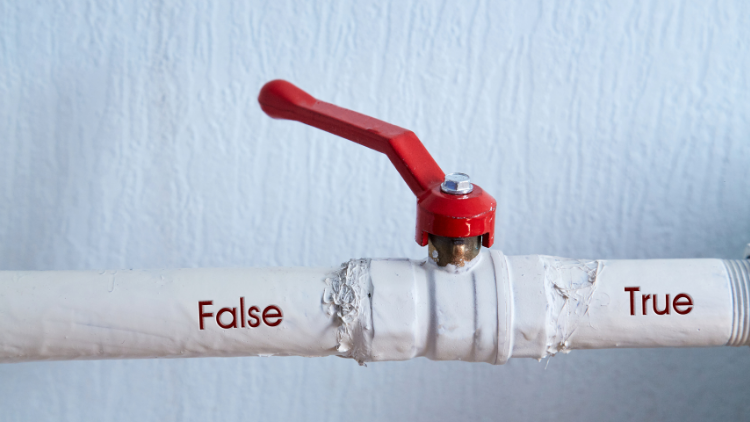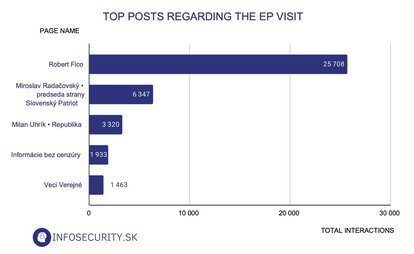DISINFORMATION
False narratives about the European Union dominate Slovak information space, including allegations of widespread corruption in the EU institutions

Infosecurity.sk presents an overview of disinformation trends that have been on the rise in information space in the past two weeks:
- Disinformers are spreading allegations of widespread corruption in the EU institutions. For this, they are massively utilising the recent “Qatargate” scandal.
- Additionally, dubious political actors focused their attention on the recent visit of the European Parliament delegation to Slovakia. It served as a way for them to discredit the EU while simultaneously push their own political agenda.
- False narratives about the war in Ukraine re-appear among the topics, including blaming the West for intentionally prolonging the war.
Alleged corruption in the EU as a tool for misleading the public
In the first half of December, the EU found itself engulfed in a corruption scandal amid allegations that Qatar bribed multiple members of the European Parliament in exchange for defending the emirate’s interests. Many of the EU’s top representatives expressed their concern over the charges, including the European Council President Charles Michel, who said the scandal is “dramatic and damaging for the credibility of the European Union”. The investigation concerning the case, now dubbed “Qatargate”, is currently ongoing.
Not long after the news broke out, many disinformation actors turned to social media, using the scandal as proof of the decadence and unreliability of the EU.
Ľuboš Hrica, a well-known Slovak disinformation actor, posted a lengthy video in which he expresses his radical anti-EU stance. He calls the EU “a den of lazy parasites, people with mental problems and corrupt gluttons who carry hundreds of thousands of euros in their pockets, which are funnelled through NGOs”, using the recent scandal as a way to delegitimise the organisation.
Hrica then proceeds to further attack the EU saying that it has no right to comment on the human rights situation in Russia, and China or even sanction Hungary “while being bribed for its leniency towards countries where human rights are at an all-time low”. This kind of rhetoric is highly misleading, since it diverts attention from one problem, in this case, the systematic human rights abuses in China and Russia or the democratic backsliding in Hungary, to another issue such as the scandal.
Disinformers are also once again adopting the rhetoric of the Hungarian prime minister Viktor Orbán, specifically his statements on the alleged corruption in the EU institutions. Mário Vidák, a hoaxer affiliated with Slovak far-right political parties, shared an article by disinformation media Plénum, which contains statements made by Orbán. “Many believe that the strings could lead to the top floors. It is time to drain the swamp here in Brussels," the article quotes him.
Re-sharing of these comments is meant to sow distrust in the EU as well as provide the anti-EU narrative with some form of legitimacy, since the statements come from a well-known political representative. However, there exists no evidence of further corruption in the EU institutions beyond the scandal that is still being investigated. The same allegations have been shared by other disinformation sites such as Hlavné Správy or Informácie bez cenzúry (Information without censorship).
Visit of the European Parliament delegation sparks a wave of hatred
Another prominent topic among Slovak disinformers was a visit of a European Parliament Monitoring Delegation to Bratislava regarding the concerns over the LGBTQI+ rights situation in Slovakia. The monitoring group for democracy, the rule of law and fundamental rights, led by MEP Sophie in ‘t Veld, stated that it will “closely monitor all relevant developments in Slovakia, including ongoing reforms in the field of the judiciary, the use of the powers of the Prosecutor General, or the cancellation of charges against high-ranking persons”. Many anti-Western politicians used this opportunity to undermine the EU and push their own political agenda.
Robert Fico, the former Prime Minister and chairman of an anti-system party SMER-SD, posted a video, in which he calls the delegation “progressive agents of Brussels” and claims that they only visited Slovakia to attack anyone who does not agree with them. He states that “the EP, of which you are members, is literally wallowing in a corruption scandal. But you are poisoning the air in Slovakia and criticising the Prosecutor General for a decision on a matter you have no idea about. Why have you not been interested in other cases?”. With this comment, he directly points to the concerns of the delegation over the cancellation of charges against high-ranking persons including him and other political figures. This is once again a typical case of whataboutism, a tactic of diverting attention from one issue and pointing to other unrelated topics.
The same approach was taken by Ľuboš Blaha, who is also a member of SMER-SD and is currently banned on Facebook (due to repeated violations of Meta's rules regarding hate speech, bullying and harassment, inciting violence, as well as disinformation). Through his channel on Telegram, he proceeded to push the same narrative of the EU not caring about other issues, only the Prosecutor General decision, even though the main reason for the visit was to monitor the LGBTQI+ rights situation in Slovakia. In his post, he goes as far as to insult Sophie in ‘t Veld, calling her uneducated and an extremist.
The statements of Robert Fico and Ľuboš Blaha have been re-shared by multiple disinformation sites such as Informácie bez cenzúry (Information without censorship) and Slobodný vysielač (Free Broadcaster).
The EP visit and disinformers
Since the visit of the European Parliament delegation was one of the biggest topics in Slovak information space in the past two weeks, we also looked at it through an optic of a list of disinformation actors in Slovakia. We used the CrowdTangle analysis tool to analyse the most popular posts on Slovak Facebook that include the keywords “MEPs“ (“europoslanci“) and “MPs“ (“poslanci“). Posts were evaluated based on the total number of interactions (the sum of all reactions, comments, and shares).

As we can see from the results, former Prime Minister Robert Fico clearly dominates the debate. His aforementioned video, in which he criticises the EP and misleads the Slovak public, has accumulated over 193 thousand views so far.
The next post belongs to Miroslav Radačovský, a MEP and a chairman of Slovenský PATRIOT (Slovak PATRIOT) party, in which he praises the rhetoric of Robert Fico. Additionally, he attacks other Slovak politicians for relying on “the Brussels administration that is not voted by Slovaks to promote their views on the territory of the Slovak Republic” pointing to the European Parliament, whose Slovak members are elected into office by Slovak citizens.
MEP (and chairman of far-right Republika party) Milan Uhrík posted a video stating: “The superior people from Brussels have come to Slovakia to lecture us on what to do and how to do it. They should rather look after themselves and their work. Because, as we can see, they are not doing so well - Europe is crumbling in their hands and is just staggering from one crisis to the next.” Using this rhetoric he tries to undermine the importance and ability of the EU, while promoting a recurring false narrative of its decadence.
Disinformation site Informácie bez cenzúry re-shared some of the statements made by Ľuboš Blaha on Telegram, including expressive language regarding Sophie in ‘t Veld. Despite Blaha’s ban on Facebook, his content on Telegram still manages to reach wider audience.
Another dubious site Veci Verejné (Public Affairs) posted the aforementioned video made by Robert Fico. Thanks to this kind of re-sharing, the video has accumulated over 195 thousand views so far.
The West is being blamed for deliberately prolonging the War in Ukraine
Another prominent topic in the Slovak information space in recent weeks was the war in Ukraine. More specifically, the following narratives are involved: the West is directly responsible for prolonging the war by sending weapons and ammunition to the Ukrainian armed forces, the Western representatives are warmongers and president Zelenskyy is acting as an agent of the US president Joe Biden.
Milan Uhrík posted a photo of Zelenskyy and Biden together and wrote: “When I see these two men together, peace is not so soon to come to Europe. Actually there is not that much difference between them. One an actor, the other a puppet. Both out of touch with reality. Yes, dragging out the war in Ukraine is in America's economic interest. They want Europe to be dependent on the US and not be an economic competitor or threat to them. And the Ukrainians will bleed for it.”
Slavěna Vorobelová, a member of the far-right Kotlebovci-ĽSNS party, shared a lengthy post promoting all three mentioned narratives. In addition, she states: “Are the warmongers, supporters of arms and ammunition supplies aware of such things as the population, size, strength and logistical capabilities of the army? ... Do they realise that Russia will not lose this war and the only way to peace and to save Ukraine and the Ukrainian people is to stop Russian military actions, which will only happen as a result of Ukraine accepting Russia's terms and achieving Russia's stated military objectives?” The aim of this kind of rhetoric is to undermine the public trust in the fighting capabilities of Ukraine and push the narrative that the only way to stop the war is for Ukraine to surrender.
Spreading narratives such as these is highly problematic, since it deliberately diverts attention from the escalation of the conflict by Russian forces, as well as the underlying fact that the only aggressor in this war is Russia. Moreover, most of these claims are nothing but mere conspiracy theories presented as facts, which the disinformation actors provide no evidence for. This behaviour represents the long-standing efforts of pro-Russian disinformers to defend Russia's interests. In doing so, they essentially ignore the country’s military failures and keep over-emphasizing it as the decisive actor in the conflict.
Project Infosecurity.sk organized by Adapt Institute, which is supported by the Prague office of the Friedrich Naumann Foundation for Freedom, continuously monitors the activities of both Slovak and foreign disinformation actors, but focuses mainly on the former. The project activities are built upon daily monitoring of emerging disinformation, hoaxes, and conspiracy theories in the online information space. This approach allows the analysts to identify disinformation posts and narratives that resonated with the public the most, as well as to find out where they originated, and how they spread and evolved on social media. The report takes the form of a bi-weekly summary of arising trends in the spread of malicious information content online. Based on that, Infosecurity.sk can warn the public about emerging and current trends in the field of disinformation, manipulation, and propaganda.

